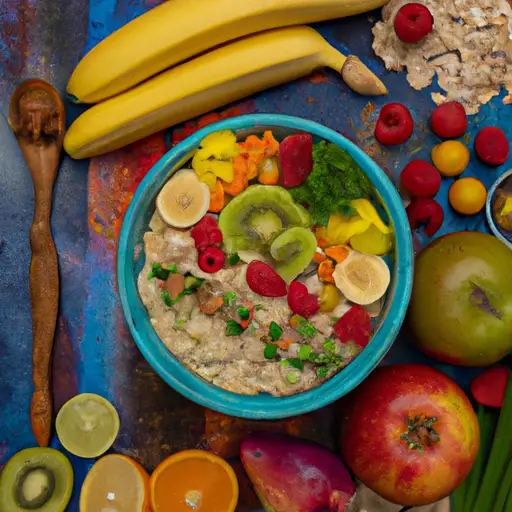An Inside Look At The Gluten-Free Diet
So, what’s the deal with a gluten-free diet? Well, in its simplest terms, a gluten-free diet is one that avoids all forms of gluten, which is a type of protein found mostly in wheat, barley and rye. If you’ve ever been prescribed this diet by your doc, or if you’re considering following it yourself, there’s some cool things you should know before diving in!
First off, let’s talk about the benefits. Following a gluten-free diet can make a massive difference for those suffering from digestive problems like bloating and IBS. Not only that – it can also have great impacts on your heart health, as well as help you achieve your weight loss goals too.
But bear in mind that like any diet, there can be risks involved in following a gluten-free lifestyle. Without careful planning and monitoring, a GF diet can lead to nutrient deficiencies and an increased risk of developing Type 2 Diabetes. Additionally, it can work out more expensive in the long run because 100% gluten free foods are often pricier.
As far as who should be following a gluten-free diet, it depends on your individual circumstances – if you’ve been diagnosed with celiac disease, then this diet is essential. But even people who haven’t been diagnosed but are showing symptoms of gluten intolerance could benefit from this kind of diet.

If you’re ready to give it a go, here’s the lowdown on how to get started. Start by being really diligent with reading the ingredients labels on food – if gluten’s included in any capacity, it’s off the menu. Next, switch up your grains for ones with no gluten in them, like buckwheat, quinoa and rice. Lastly, take extra special care not to cross contaminate when cooking: keep separate utensils, pots and pans for all your gluten-free meals!
Benefits of Gluten-Free Diet
Ditching gluten in your diet can bring some serious perks. I’m talking major benefits, like improved digestive health, lower risk of heart disease, and even weight loss! Let’s take a look at the three main benefits.
Improved Digestive Health
For those who suffer from Celiac Disease, a strict gluten-free diet is essential for keeping life-threatening symptoms at bay. But many people without the celiac diagnosis have found that cutting out the gluten-filled foods from their diets has brought an improvement to their digestion. Such benefits may include fewer stomach cramps, fewer bouts of diarrhea, or less frequent bloating.
Lower Risk of Heart Disease
Eliminating grains that contain gluten from your diet can reduce your risk of developing cardiovascular disease. This is because eating gluten involves increased consumption of saturated fat and cholesterol, which can raise your blood pressure and lead to clogged arteries. Additionally, a gluten-free diet means consuming more fruits and veggies, which are packed with heart-healthy vitamins and minerals.
Weight Loss
By removing high-calorie and processed foods filled with gluten, you can easily lose weight. Replacing pasta, bread, pizza, and other carb-heavy favorites with fresh fruit, vegetables, and other gluten-free options can help you drop the pounds and reach a healthier weight. Plus, as you become more aware of what you’re eating, you’ll be more likely to make healthier choices long term, too.
Risks of Gluten-Free Diet
Going gluten-free can be great for some, but there are potential risks involved. Before you decide to ditch the wheat and other gluten sources, make sure you understand the possible down-sides.
First and foremost, if gluten is replaced with lower-fiber gluten-free options, it can lead to nutrient deficiencies. On top of that, these replacement options may contain more sugar, starches and unhealthy fats. The jury’s still out on whether or not this puts people at an increased risk of type 2 diabetes. So while the research isn’t definitive yet, it’s probably best to proceed with caution.
Another issue? Going gluten-free can cost ya. It’s not always easy to find tasty, gluten-free alternatives that are easily available. Plus, brands often charge much higher prices for ‘gluten-free’ foods, so you might pay a bit extra for the privilege.
For those who are considering making the switch, know that it’s important to weigh the pros and cons of a gluten-free diet before you dive in.
Who Should Follow a Gluten-Free Diet?
For most folks, they’ll never have to worry about going gluten-free. But if you’re one of the few who should, it’s something you can’t ignore. So who exactly should think about cutting out gluten from their lives?
The short answer is that anyone suffering from Celiac Disease or non-Celiac Gluten Sensitivity (NCGS) will want to go gluten-free. That’s because those with Celiac Disease can’t process gluten, which triggers an autoimmune response in their body when exposed. The same goes for NCGS – though the reaction isn’t as severe – but still strong enough to warrant avoiding gluten.
But these aren’t the only people who may benefit from a gluten-free diet. Some research says that even if you don’t have either condiction, cutting out gluten can still provide some digestive benefits and help improve overall health. In other words, ditching the wheat can be a smart move even if you’re not of the gluten-sensitive set.
It’s worth noting that while there are some potential positive outcomes, there can also be negatives you’ll want to consider. For instance, its entirely possible that removing gluten can lead to nutrient deficiencies and an increased risk of diabetes. Plus, it’s no secret that eating gluten-free can be more expensive than going the traditional carb route.
Bottom line: everybody is different and only you know what’s best for your body. If you suspect you are gluten intolerant, then getting tested is always a good idea so you can make an educated decision on what’s next. But whatever you do, make sure you’re putting your needs first.
How to Follow a Gluten-Free Diet
If you’re considering going gluten-free, there are some important steps you need to take. If you don’t do things right, it’s easy for mistakes to slip through the cracks, and one slip up isn’t worth all the hard work of following a gluten-free diet. But don’t worry, I’ve got your back! Here’s what you wanna do.
First, read labels like a hawk. Don’t just glance over ‘em, give them a serious once-over. You’d be surprised how sneaky gluten can be… hiding in unexpected places. And if it doesn’t explicitly say “gluten-free” then steer well clear. Better safe than sorry!
Second, get acquainted with the gluten-free grains out there. There’s plenty you can still enjoy, from quinoa and oats to buckwheat and amaranth. Rice and corn are also safe. With all these options, it can feel overwhelming to get started, but you’ll soon figure out which ones work for you.
Third, be sure to avoid cross-contamination. This is super important ‘cos being careless about where gluten crops up can cause problems for those with extreme sensitivities. So keep your gluten-free foods totally separate from everything else – like spices or condiments – that may contain even trace amounts.
Once you’ve gone through these steps it gets so much easier. It’s like second nature before you know it! The benefit of taking the extra time and effort is worth the peace of mind that comes with adhering to a strict gluten-free diet.
Conclusion
I’m here to tell you that gluten-free diets can be a powerful tool for improving your health. But it’s also important to understand the benefits and risks associated with them, so you can make an informed decision that works best for your body.
First off, people with celiac disease and those with non-celiac gluten sensitivity should definitely follow a gluten-free diet. For everyone else, it’s really up to you to decide if it’s worth it. If you do go gluten-free, read ingredient labels closely, choose gluten-free grains, and avoid cross-contamination.
The bottom line is: if you think a gluten-free diet can help you lead a healthier life, then give it a whirl! With dedication, patience and a bit of creativity, you may just find out gluten-free living is exactly what you need.
FAQs About Gluten-Free Diet
Why are doctors against a gluten-free diet?
As a long-time healthcare professional, I can tell you that doctors are generally against a gluten-free diet. It’s not that they want you to suffer – it’s just that eliminating gluten can lead to deficiencies in essential nutrients, such as iron, calcium, and vitamin D. Plus, unless gluten is specifically contributing to a health issue, there’s no need to eliminate it from your diet.
In my experience, cutting out gluten without knowing what it’s actually doing can be detrimental. It can reduce the variety in your meals, which can lead to deficiencies, and it can require additional supplementation of vitamins and minerals that would be naturally found in foods containing gluten. In addition, gluten-free foods tend to be more processed, which means they are lower in fiber and higher in fat and sugar, which can have a negative impact on overall health.
It’s also worth noting that gluten-free products often cost more than their regular counterparts, so cutting it out of your diet can add up to costly grocery bills. All in all, it’s important to consult with a doctor or dietitian before eliminating gluten from your diet so that you can make sure you’re still getting all the nutrients you need.
Do doctors recommend a gluten-free diet?
Well, it depends. As an experienced reporter, I’ve heard from a lot of medical professionals that following a gluten-free diet isn’t necessarily a one-size-fits-all solution. It all comes down to personal preference, medical history, and overall health. For instance, it’s generally a smart move for folks who have been diagnosed with celiac disease, an autoimmune disorder that’s triggered when you ingest gluten, to stick to a gluten-free diet. But, even if you don’t suffer from celiac, if you’re intolerant to gluten or have a wheat-allergy, then some docs may advise a diet free of gluten-containing foods.
For the average person, though, the truth is that there isn’t really evidence that a gluten-free diet is any healthier than any other kind. Some docs may recommend it if they think that avoiding things like wheat and barley can help the patient’s symptoms, but ultimately, it’s more of a personal choice. Ultimately, what it comes down to is that docs don’t necessarily recommend a gluten-free diet, but they will help patients decide if this dietary choice is right for them.
Is gluten-free really healthier?
As someone with firsthand experience, I can confidently say that gluten-free isn’t necessarily healthier than regular gluten-filled foods. Sure, some folks may find that they feel better after switching to a gluten-free diet, but that doesn’t necessarily mean it’s better for everyone. So, if you’re wondering if you’ll benefit from cutting out gluten, it’s best to consult with a knowledgeable medical professional to get their take.
In my opinion, one of the most important things to consider when deciding to go gluten-free is the quality of the food you’re eating. When it comes to gluten-free products, you really have to do your due diligence. Gluten-free processed foods can be high in unhealthy fats, sugars, and calories — making them an unhealthy choice. If you’re going to go gluten-free, make sure you’re opting for wholesome, nutrient-dense foods like fruits, vegetables, nuts, and seeds, rather than highly processed, gluten-free substitutes.
Lastly, I’d encourage you to be mindful of why you’re choosing to go gluten-free. If it’s not because of a medical necessity, it may be best to keep gluten in your diet in moderation. After all, whole grains provide essential nutrients and an array of health benefits. So, if you’re choosing to go gluten-free, just make sure it’s for the right reasons and that you’re still getting the necessary nutrients from other sources.
the truth about gluten-free diets
When it comes to gluten-free diets, there’s a lot of confusion and misinformation out there. As a journalist, I’ve done a lot of research on this topic, and here’s the truth about gluten-free diets.
For starters, there are two types of people who should avoid gluten: people with celiac disease and those with gluten sensitivity. Celiac disease is an autoimmune disorder in which the body treats gluten like a foreign substance and attacks it. If you have this condition, you have no choice but to go gluten-free. However, if you have gluten sensitivity, you can still eat foods with gluten, though you may have digestive issues or discomfort.
For everyone else, going gluten-free isn’t necessarily a bad thing, but it isn’t necessarily a good thing either. Some people swear by following a gluten-free diet, claiming that it can help with weight loss, improved energy levels, and better digestive health. But research into these claims is inconclusive, so it’s best to talk to your doctor and do your own research before making any major dietary changes.
Bottom line: if you don’t have celiac disease or gluten sensitivity, a gluten-free diet may or may not be beneficial for you. But it’s important to research your options and talk to your doctor before making any major dietary changes.






